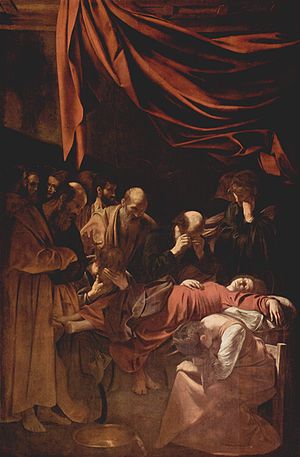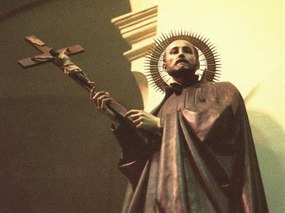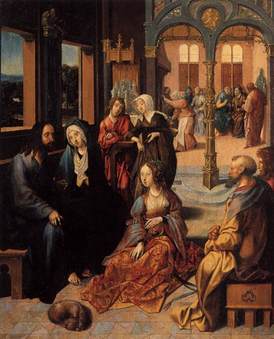 Those Christians who are not Orthodox –as in, Orthodox Christians or Eastern Orthodox or some version of this– are likely not to be aware that today begins the traditional time of fasting in preparation for the great feast of the of the Assumption (if you are Catholic) or Dormition (if you are Orthodox) of the Blessed Virgin Mary (Theotokos), the all-holy Mother of God. In fact, the Churches of East and West are called upon to prepare for the yearly festival of our Lady by prayer, fasting and almsgiving. Sound familiar? Indeed, the 3-point spiritual discipline is identical with Lent and Advent.
Those Christians who are not Orthodox –as in, Orthodox Christians or Eastern Orthodox or some version of this– are likely not to be aware that today begins the traditional time of fasting in preparation for the great feast of the of the Assumption (if you are Catholic) or Dormition (if you are Orthodox) of the Blessed Virgin Mary (Theotokos), the all-holy Mother of God. In fact, the Churches of East and West are called upon to prepare for the yearly festival of our Lady by prayer, fasting and almsgiving. Sound familiar? Indeed, the 3-point spiritual discipline is identical with Lent and Advent.
On the 18th Sunday through the year
 Vanity of vanities! All things are vanity!
Vanity of vanities! All things are vanity!
All our striving and our toil are things we leave behind!
Each day and night we strive, we work
And still at the end will die:
If today you shall hear the voice of the Lord,
Then attend God’s gracious word!
Greed in all its forms brings death, and things cannot give life.
Fools are we to grow rich for self and not grow rich with God!
“Eat, drink, be merry,” calls the world,
And still at the end we die:
If today you shall hear the voice of the Lord,
Then attend God’s gracious word!
Raised up now with Christ from death, we set our hearts on high;
Hidden now with Christ is our life, to glory we shall rise!
Fix now our hearts on things above,
Yes, even though we die:
If today you shall hear the voice of the Lord,
Then attend God’s gracious word!
Pope Benedict XVI’s monthly prayer intentions for August 2010
Saint Alphonsus Ligouri, whose feast is celebrated today, tells in his “Necessity and Power of Prayer,” that “St. Isidore observes, the devil is never more busy to distract us with the thoughts of worldly cares than when he perceives us praying and asking God for grace: ‘Then mostly does the devil insinuate thoughts, when he sees a man praying.'”
Saint Ignatius of Loyola
 To your Name’s own greater glory,
To your Name’s own greater glory,
In the midst of worldly strife,
Came Ignatius called Loyola,
Building up your Church’s life.
That the gospel of the Savior,
With its news of endless grace
Might be brought by his companions
Unto ev’ry land and race.
Once a warrior for earth’s kingdoms,
Gravely wounded, he became
Soldier for the King of heaven,
Limping forth in Jesus’ name.
Once in Paris, he found others
Who alike heard Jesus’ call;
Soldiers, poor and chaste, obedient,
There they gave to Christ their all.
In his living and his dying,
He has shown to ev’ryone
What it means to lose one’s own self,
How to live for Christ the Son.
May his love, which scorned all travail,
Teach us how to follow you;
May our love, in his example,
Be to Christ forever true.
To the Father, life’s own author,
To the Son, who sets us free,
To the Spirit, voice of prophets,
Three-In-One, all praises be!
From the mouth of Saint Ignatius
Comes a song of matchless praise;
All the Church, on earth, in heaven,
Joins, as now this hymn we raise.
J. Michael Thompson
Copyright © 2009, World Library Publications
87 87 D; IN BABILONE, HOLY MANNA
Bishop David O’Connell: God gives the grace
I have been thinking a great deal in recent months about the role and ministry of bishops in the Church. You might think, sitting here in the Cathedral today in the midst of this beautifully moving ceremony, you had good reason for such reflection! And, while there is real truth to that reaction — at least since the Apostolic Nuncio first met with me on May 24 about coming to Trenton — I did have some other motivations. For the past twelve years, I was president of The Catholic University of America in Washington, D.C, a place that is known as the “bishops’ university.” I am grateful that so many of my colleagues and friends from Catholic University are here with us today, both in the pews and around the sanctuary. Throughout those twelve years, I had many occasions to get to know bishops from around the country either as university trustees or as visitors to campus. We spoke about many things: their dioceses, their experiences, their joys and their challenges. I came to admire them as good men, good priests and good leaders. Although they all differed from one another in many ways, they all had one thing in common: they loved their people.
Today, through the grace and mercy of God and the sacrament of ordination, I join their ranks as successors to the Apostles. Like them, I approached this day filled with joy and gratitude but also with a sense of humility and awe. Like them, I am profoundly aware of my flaws and limitations, that I am far from perfect. Like them, I do not know what the future will hold but I am quite sure that the expectations are as many and as different as there are people in and outside of this Cathedral.
When the Apostolic Nuncio spoke with me that morning in late May, he shared much information about the Diocese of Trenton and the process involved in my appointment. But he said something to me that I will never forget: “Father, always remember that there are over 830,000 souls in your Diocese. And you will be responsible for all of them.” What has been very much on my mind since that conversation is simply this: how will I exercise that responsibility?
The other day, someone asked me how long it took to come up with my Episcopal motto, Ministrare non Ministrari — “to serve and not to be served” — to which I responded, “about two seconds.” When I was first ordained a Vincentian priest — and I am so happy to see so many of my confreres here — the Gospel reading for the ordination Mass contained those words of Jesus Christ in Mark’s Gospel. I was struck with the phrase then as being a perfect description of how to follow the Lord as a priest: “to serve and not to be served and to give my life as a ransom for the many.” This was how I wanted to live out my life as a priest. This is how I want to live out my life as a bishop and how I hope to exercise that responsibility.
According to the Second Vatican Council, “Christ gave the apostles and their successors the mandate and the power to teach all nations and to sanctify and shepherd their people in truth (Christus Dominus, 12).” To teach. To sanctify. To shepherd their people in truth. Christ gave this mandate to the successors to the Apostles. Christ gave this power. And with power like this comes great responsibility. Please pray for me.
“To serve and not to be served.” In my letter to our Holy Father Pope Benedict XVI accepting his appointment, I wrote to him of my choice of a motto. In his response to me read here today, he repeated them.
A bishop serves his people by teaching truth. The truth that comes through the Gospel, the truth that comes through the Church and all its teachings, the truth that lives among us a community of faith, for “where two or three are gathered in my name, there am I in the midst of them (Matthew 18: 20).” This is how a bishop serves, not by being served through compromise or taking the easy way out, not by being served saying only what people want to hear or what makes them comfortable, striving to be popular. As Pope John Paul II wrote, the truth that we teach “has its origin in God himself … (but) people can even run from the truth because they are afraid of its demands (Fides et ratio, 7; 28).” Christians cannot run from the truth for this reason. Nor can the bishop. This is how he serves.
A bishop also serves by sanctifying his people and by leading them to holiness. And there is only one way to holiness: Jesus Christ and a personal relationship with him, convinced in faith as we must be that he alone is “the way, the truth and the life (John 14: 6).” All three make us holy. Jesus Christ is the Risen Lord. He triumphed over death and every suffering and evil. The bishop is called, it is said, to be a servant of the empty tomb not of the status quo. He leads his people to holiness by bearing witness to what the empty tomb means: joy, hope, the promise of new life, remembering Jesus’ own words: “In the world you will have troubles but take courage: I have overcome the world (John 16:33).” This is how the bishop serves.
Finally, a bishop serves by leading, by guiding, by shepherding his people. This is, perhaps, the most difficult not only for those he governs as bishop but for the bishop himself, marked as he is by human weakness. But lead he must, by word and example. God gives the grace. And follow we must. God gives the grace. The answers that we may seek from him, the answers that we may want from him may sometimes not be what we seek or want. Sometimes the answer is no. “The gate is narrow and the road is long that leads to life (Matthew 7: 14).” This is how the bishop serves and this is where that service leads: to life.
To serve and not to be served. To teach. To sanctify. To shepherd. This is what a bishop does for God’s people and with God’s people: brother bishops, fellow priests, deacons, faithful religious women and men and all the baptized, one community of faith. With a grateful heart I thank you for being here today, too many to call by name. Please know that I care deeply for you all. With humble, faithful hearts, let us go forward, together, “to serve and not to be served.”
Anne Rice quits Christianity
Noted author Anne Rice on her Facebook page wrote: “In the name of Christ, I quit Christianity and being Christian” because she regards Christians as “quarrelsome, hostile, disputatious, and deservedly infamous.”
Ms. Rice also added she refuses to be “anti-gay, anti-feminist and anti-Democrat.”
Interestingly, she quits Christianity in the name of Christ. Hmmm.
I hope Ms Rice knows that Jesus Christ does not leave her alone and neither does He abandon her. And neither does the Church abandon her, nor ceases to care for her salvation.
I pray for Ms Rice’s peace of soul and eventual return to her Mother, the Catholic Church.
Saint Peter Chrysologus
O God, who made the Bishop Saint Peter Chrysologus an outstanding preacher of your Incarnate Word, grant, through his intercession, that we may constantly ponder in our hearts the mysteries of your salvation and faithfully express them in what we do. Through our Lord.
Later Summer Reading 2010
If you are looking for something to read this summer, I would suggest some of the following I gleaned from the Fall 2010 Eerdmans catalog:
Conor Cunningham’s Darwin’s Pious Idea
Ron Austin’s Peregrino: A Pilgrim Journey into Catholic
Mexico
Charles Mathewes’ The Republic of Grace: Augustinian
Thoughts for Dark Times
Carl Braaten’s Because of Christ: Memoirs of a Lutheran
Theologian
Livio Melina’s The Epiphany of Love: Toward a Theological
Understanding of Christian Action
Edward O’Flaherty, Rodney Petersen and Timothy Norton’s
Sunday, Sabbath and the Weekend: Managing Time in a Global Culture
Kevin Codd’s To the Field of Dreams (subject: on making the pilgrimage to Compostella)
Saint Martha
 In midst of burning desert heat
In midst of burning desert heat
Three strangers came along the way
Where Abraham and Sarah stayed;
He saw them, and begged them to stay.
In hospitality, he sought
To care for each and ev’ry need;
In answer came the promise sweet:
“Your wife will bear a son, indeed.”
In much the same way, Jesus came
To Martha and to Mary’s place;
While Mary sat and heard the Lord,
All awed by such amazing grace,
Her sister called, rebuking her
And scolded Christ for lack of care.
But Jesus said, “What Mary chose
Alone is needful, and most fair.”
In giving hospitality,
We serve our God in neighbor’s guise;
The trouble others seem to be
Will oft be Christ, to our surprise;
And yet the one thing needful is
The mystery of Christ in all,
Our hope of glory. Here we sit
And hear our Master’s loving call.
Responding to an Episcopal priest on giving communion to a dog
The other day I made a post on this blog about a Canadian
woman priest giving Communion to a dog. A reader of the Communio blog, Lydia
wrote to me saying:
I am a priest in the Episcopal Church in the US.
The Anglican Communion does not have priestesses. I am sure that you know
that. Perhaps you are just being sarcastic.
Personally, I would rather have my
Church known for giving communion to a dog than for the fact that many of my
priests molested children, in countries all over the world, and that
my Bishops did all that they could to ignore complaints about the abuse,
to hide the problem, and to protect the offending clergy.
My response to Lydia
The dictionary defines a priestess as a female priest. It’s a perfectly good
English word; in fact, the Anglican C.S. Lewis wrote an essay called, “Priestesses
in the Church.” If the word “priestess” has a strangely non-Christian
sound, perhaps that is because in churches that claim apostolic succession,
there is no precedent for female priests. As Lewis pointed out, there have been
many religions with female priests (priestesses), but these religions are very
different from Christianity as it has been known for 20 centuries.
In any case,
the word “deaconess” is not considered offensive, so why should
“priestess” be so considered? If masculine imagery for divine transcendence
needs to be balanced by feminine imagery of divine immanence, why not say that
priest and priestess together represent the divine more fully, like Yin and
Yang? My impression is that many modern Anglicans (including women
clergypersons) think on those lines. So why fight about the sound of a word
when its substantive meaning is considered OK?
As for the Catholic Church being
“known for” molestation of children and minors: well, the Anglican
Church in Canada and Australia has been racked by similar problems, particularly
in residential schools, with some dioceses being nearly bankrupted. I am saddened
by the Anglicans’ troubles since the attacks on their schools is an indirect
form of anti-Christian persecution at the hands of a hostile state. As such,
this abuse hysteria threatens us all because it is premised on the assumption
that the sins of a few abusive clergy should be avenged on the entire Body of
Christ. In the case of any other group besides the clergy, this would be
considered unjust prejudice and overreaction.
Statistically speaking, Catholic
priests are no more likely to molest than ministers of other religions; it’s
just that we are a much larger church and that our dioceses are legally set up
as a corporation sole, thus inviting crippling lawsuits and lots of bad
publicity. That said, I do agree that we Catholics are not in a position to
cast any stones on the sexual abuse issue. And so this blog has not done so.
Gross
liturgical abuses and irreverence are a different sort of issue. These
liturgical-sacramental aberrations are public acts done in an official
capacity, not secret sins or obvious crimes. And, in fact, I do emphatically
criticize and abhor similar liturgical abuses among Catholics and wish that
more Catholic parishes had the reverence and decorum to be found in many
high-church Episcopal parishes. It’s not a matter of either side of the
Reformation divide being free of sin or failure: it’s just that without an
authoritative center of communion and teaching and practice, Anglicanism can’t
easily set any parameters for legitimate diversity within itself. And
Archbishop Williams himself would sadly admit that that is unfortunately the
case.
